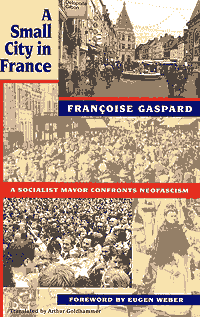| Book Review Archive 08.09.02 [48] |
|
||||
|
A Socialist Mayor Confronts Neofascism by Francoise Gaspard
The 'small city' here is Dreux, 60 miles west of Paris. The question is
asked, how could the Front Nationale of Le Pen capture 61% of the Dreux
vote in 1989? Francoise Gaspard was once the Socialist mayor of Dreux, and
brings her knowledge of local demographics and history to bear. Up until
the early 1950s, Dreux was a small town, but between 1954 and 1975 the population
rose from 16,818 to 33,095 (+ 197%) bringing with it severe social stress,
and a perceived threat to the social identity of the town. New, but horrible
high rise estates mushroomed in the former fields around the edges. At first,
workers from Brittany came in, then Italians, Hungarians and the Spanish.
Later Moroccans came, and after 1962 the 'Harkis' - former Algerian soldiers,
displaced when the French pulled out. During the same period, long standing
traditional industries declined - the shoe factory closed in 1960, for example.
New industries, cars pharmaceuticals, and aerospace, opened up. A TV tube
factory created 6,000 new jobs. Despite this seeming prosperity, racist
tensions bubbled underneath. In July 1971 a reception centre burned down.
TERRITORY FOR EXTREMISTS
Prosperity left in the early 1970s, stagnation and recession set in. Through
1975 to 1985 many factories closed in the wake of the OPEC oil embargo.
Communities tended to be ghettoized in separate estates, with white working
class people uneasy, looking for scapegoats. From its groundbase of ex-Vichyites,
extreme Gaullists and OAS supporters (militant pro-colonialists opposed
to withdrawal from Algeria) the FN started to grow. 'Where there is ugliness, there is no democracy. When things are rotten, democracy goes out of the
window' - Roland Castro, Architect.
ELECTORAL PACT WITH THE RIGHT
A local FN politician, Jean Pierre Stirbois, formed an electoral pact with
the CDS, a right wing party. This was a shrewd political move, giving him
the electoral leverage to get into the local council chamber. The elections
were characterised by dirty tricks like the 'Dear Mustapha' letter, a stunt
designed to whip up racial hatred, and fake posters suggesting central government
were planning to settle thousands of foreign workers in the empty estate
flats. By 4th September 1983, after eleven years of such tricks and electoral
horse-trading, the FN could poll 17% of the vote. In just four years they
had moved up to this from 303 votes (2.5%) Earlier in 1983, the left held
on by a mere 8 votes. Low turn out and the drift away from the left helped
the far right. By 1989, they could poll 61%, a worrying thought if the BNP
electoral progress mirrors this in Burnley and Oldham.
What solutions does Francoise Gaspard offer? - This is the most disturbing
part of the book. The militant anti fascist left has been 'unable to mobilise anyone but themselves'. [p 115] Intellectuals have been silent or ineffectual.
The mainstream right has actively collaborated with the fascists and (something
like the mainstream parties in Britain) apes their xenophobic, racist rhetoric.
Central government allowed the situation to continue as a demographic calibration
exercise, (the so-called 'Matignon Experiment' ). About the only real ray
of hope on the horizon were the ordinary people who went round the vast
high rise estates recounting their own experiences of the Vichy era and
the mass deportations, to try to persuade people not to vote FN [p 163].
Aside from this, she offers no real answers, the usual platitudes about
'rediscovering the citizen' and for political parties to rediscover the
voters.
THIS LETTER FROM WEIMAR IS NOT GOOD ENOUGH
This is not good enough, in my opinion. Do we find there is any real acknowledgement
there that their built up urban environment, and recessions fuel it? Is
there a real willingness to tackle this head on? She talks about the breakdown
of civic virtue, yes, and admits that 'to build a place like that was a
crime'. [p 151] To talk of 'Rediscovering the Citizen' and that whole agenda
represents an unacceptable rightwards shift in thinking. The rise of the
FN and other far right parties, is partly a result of the failure of the
left. The left became complacent, bureaucratic, distant and corrupt. The
first step towards an answer is to acknowledge this. The next step involves
reconnecting with people, not in tokenistic focus group ways or through
fake PR exercises, but by putting their needs and aspirations at the centre.
This problem will not be addressed by imposing yet another skewed, pro-capitalist,
communitarian agenda. A basic core Socialism would repudiate, reject, challenge
the evil of global capitalism, not go along with it. It wholly excludes
'Blairism' and similar creeds. It unequivocally encompasses such things
as the democratic public ownership of utilities, public transport and the
right to free access to education. Without this, the left has not got a
hope in hell of reconnecting with the people, because it subordinates itself
to the right.
This said, I believe this book is well meaning, its factual descriptions
of what is happening are good, even if its 'solutions' are watery. This
book ought to be studied by everyone who wants to oppose the rise of the
far right.
|
|||
|
BLUE is looking for short fiction, extracts of novels, poetry, lyrics,
polemics, opinions, eyewitness accounts, news, features, information and arts
in any form relating to eco cultural- social- spiritual issues, events and
activites (creative and political). Send to Newsdesk. |

 INDUSTRIAL DECLINE AND SOCIAL TENSIONS
INDUSTRIAL DECLINE AND SOCIAL TENSIONS

 Green Anarchist:
Green Anarchist: